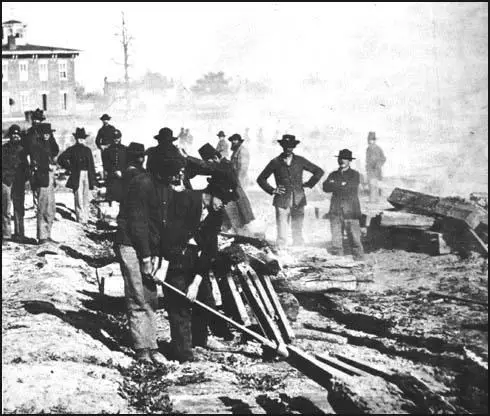Atlanta Campaign
On 7th May Ulysses S. Grant gave William Sherman the task of destroying the Confederate Army in Tennessee. Joseph E. Johnston and his army retreated and after some brief skirmishes the two sides fought at Resaca (14th May), Adairsvile (17th May), New Hope Church (25th May), Kennesaw Mountain (27th June) and Marietta (2nd July).
Sherman decided to deprive the South of its resources. He cut a swathe of destruction 60 miles wide and 40 miles wide. Sherman commented: "If the people of Georgia raise a howl against my barbarity and cruelty, I will answer that war is war, and not popularity-seeking." His forces moved fast covering 450 miles in 50 days.

troops pulling up railroad tracks in Atlanta (1864)
President Jefferson Davis was unhappy about Johnson's withdrawal policy and on 17th July replaced him with the more aggressive John Hood. He immediately went on the attack and hit George H. Thomas and his men at Peachtree Creek. Hood was badly beaten and lost 2,500 men. Two days later he took on William Sherman at Atlanta and lost another 8,000 men.
The Union Army gradually cut off supplies to Atlanta from the South and John Hood eventually decided to abandon the city on 1st September, 1864. The following day William Sherman entered Atlanta and set fire to it.
Primary Sources
(1) Orders issued by William Sherman before his Atlanta Campaign (9th November, 1864)
The army will forage liberally on the country during the march. To this end, each brigade commander will organize a good and sufficient foraging party, under the command of one or more discreet officers, who will gather, near the route traveled, corn or forage of any kind, meat of any kind, vegetables, corn-meal, or whatever is needed by the command, aiming at all times to keep in the wagons at least ten days' provisions for his command, aiming at all times to keep in the wagons at least ten days' provisions for his command, and three days' forage. Soldiers must not enter the dwellings they may be permitted to gather turnips, potatoes, and other vegetables, and to drive in stock in sight of their camp.
To corps commanders alone is entrusted the power to destroy mills, houses, cotton-gins, etc.; and for them the general principle is laid down: In districts and neighborhoods where the army is unmolested, no destruction of such property should be permitted; but should guerrillas or bush-whackers molest our march, or should the inhabitants burn bridges, obstruct roads, or otherwise manifest local hostility, then army commanders should order and enforce a devastation more or less relentless, according to the measure of such hostility. As for horses, mules, wagons, etc., belonging to the inhabitants, the cavalry and artillery may appropriate freely and without limit; discriminating, however, between the rich, who are usually hostile, and the poor and industrious, usually neutral or friendly.
(2) William Sherman wrote about his Atlanta Campaign in his Memoirs published in 1875.
The skill and success of the men in collecting forage was one of the features of this march. Each brigade commander had authority to detail a company of foragers, usually about fifty men, with one or two commissioned officers selected for their boldness and enterprise. This party would be dispatched before daylight with a knowledge of the intended day's march and camp; would proceed on foot five or six miles from the route traveled by their brigade, and then visit every plantation and farm within range. They would usually procure a wagon or family carriage, load it with bacon, corn-meal, turkeys, chickens, ducks, and every thing that could be used as food or forage, and would then regain the main road, usually in advance of their train. No doubt, many acts of pillage, robbery, and violence, were committed by these parties of foragers, for I have since heard of jewelry taken from women, and the plunder of articles that never reached the commissary; but these acts were exceptional and incidental. I never heard of any cases of murder or rape; and no army could have carried along sufficient food and forage for a march of three hundred miles; so that foraging in some shape was necessary.
(3) Statement issued by the members of the Georgia Congress (19th November, 1864)
We have had a special conference with President Davis and the Secretary of War, and are able to assure you that they have done and are still doing all that can be done to meet the emergency that presses upon you. Let every man fly to arms! Remove your negroes, horses, cattle, and provisions from Sherman's army, and burn what you cannot carry. Burn all bridges, and block up the roads in his route. Assail the invader in front, flank, and rear, by night and by day. Let him have no rest.

